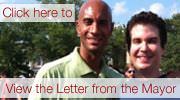In The Press
The Hill, April 06, 2011
DC’s unique career opportunities by J.J. Steele
D.C.’s young professionals don’t shy away from competition as they seek to develop their careers in politics, journalism and nonprofit work.
Freshman Rep. David Schweikert (R-Ariz.) said that because of the fast-paced work environment of political staffers, the younger crowd is often better able to adapt to the job.
“It’s very competitive, so the types of folks who are able to get employment here are often some of the best and brightest,” said Schweikert.
“We’ve had close to 600 résumés that were delivered to our office. When you have that sort of pool to select from, you end up with a concentration of talent.”
Schweikert said that a lot of the young professionals in Washington are hardworking people who are willing to “subordinate a lifestyle to be players in a very big game.”
As of November 2008, there were approximately 320,000 government employees in the Washington metropolitan area, according to the Bureau of Labor Statistics (BLS).
Michael Karlan, president of the country’s largest social and networking organization, said that lots of professionals come to Washington because of the abundance of jobs available on Capitol Hill and with law firms and nonprofits.
“There are a lot of opportunities here that you just don’t have in other cities,” Karlan said.
With more than 200,000 members, Professionals in the City holds events in the D.C. community to help professionals meet new people and develop their careers through networking. You can find a list of upcoming events at the organization’s website, prosinthecity.com.
Karlan added that networking is a crucial part of professional development in Washington.
“So much of it is who you know and what kind of connections you have … it’s all about people, so [networking] is very important in Washington,” he said.
Wally Dean, a journalist for more than 40 years and current director of training for the Committee of Concerned Journalists, said that the number of niche publications in Washington is bringing younger reporters to work in the nation’s capital.
“I think that the vast number of niche publications attract younger, less-experienced journalists because they’ve often now moved to the Internet and the younger journalists are more comfortable with that,” he said.
Dean said that although younger journalists are most attracted to these organizations, some more experienced journalists gravitate to niche publications because they have developed expertise in a certain area.
“Journalists in Washington tend to be more interested in specific topics … and are the types of journalists who would rather go deep than wide,” he said.
As of January, Washington and surrounding cities had a 6.1 percent unemployment rate, well below the national average of 8.8 percent, according to the BLS.
The BLS predicts that in the next decade, many federal government positions will open, due to a spike in the number of workers retiring.
If you find the right career fit for you, working in Washington can provide lots of opportunities for professional advancement.




 Menu
Menu





